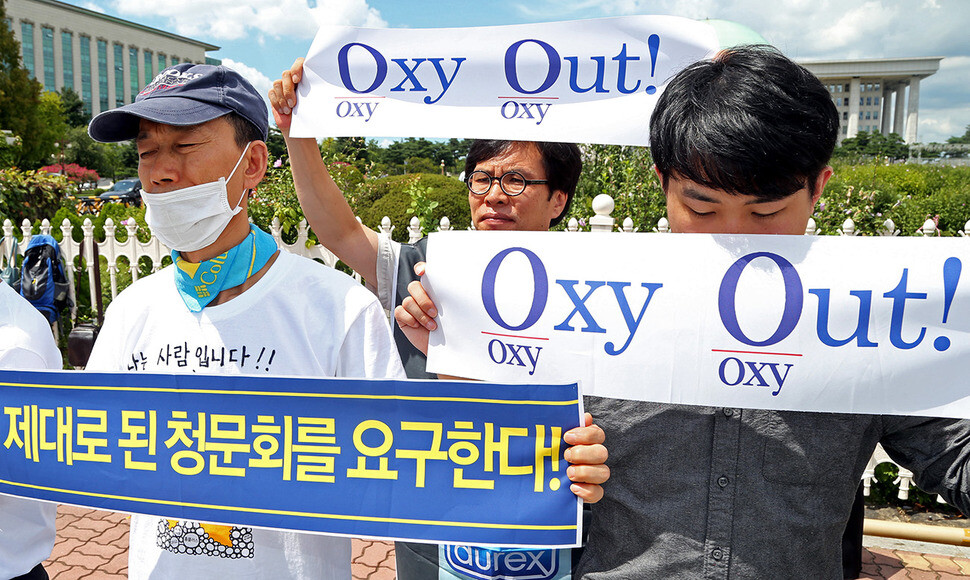hankyoreh
Links to other country sites 다른 나라 사이트 링크
New system would seek threefold compensation from companies that make harmful products

A new punitive damage system would require compensation up to three times greater from manufacturers of products that result in a large human toll, as with a recent case involving deaths and injuries from the use of humidifier disinfectant.
The South Korean government is also considering steps to loosen some restrictions in the so-called Kim Young-ran Act to combat corruption.
“A strong economy” was the theme of operational reports by five economy-related agencies - including the Ministry of Strategy and Finance (MOSF), the Ministry of Trade, Industry and Energy (MTIE), and the Fair Trade Commission (FTC) - held on Jan. 5 under Acting President and Prime Minister Hwang Kyo-ahn. FTC chairperson Jeong Jae-chan presented an operational plan for “creating a vital market together with companies and consumers.”
“We are amending the Product Liability Act to institute a punitive damage system that would assign liability for up to three times the [current] damages in cases of deliberate causing of grievous harm to consumers’ lives and physical health,” Jeong said.
Punitive damage systems currently operate under only limited circumstances according to the Subcontracting Act and Personal Information Protection Act.
“Simply instituting a punitive damage system will have a substantial warning effect that will reduce legal violations by companies,” Jeong predicted.
The FTC also said it plans to loosen burden of proof requirements for consumer damages due to product flaws. While victims are currently required to provide direct proof of product defects and their causal link with damages, the new institutional changes would allow for broader recognition of both in cases where damages occurred during normal use of a product.
Amendment of the Kim Young-ran Act, which entered effect in late Sep. 2016, was also mentioned in the reports. Korea Development Institute (KDI) senior economist Kim Joo-hoon said the current cap of 30,000 won (US$25.40) on paying for meals “needs to be made more realistic in light of inflation and other factors.” The government plans to consult the suggestions in amending the act’s enforcement decree.
By Kwack Jung-soo, business correspondent and Kim Kyung-rok, staff reporter
Please direct questions or comments to [english@hani.co.kr]

Editorial・opinion
![[Guest essay] Maybe Korea’s rapid population decline is an opportunity, not a crisis [Guest essay] Maybe Korea’s rapid population decline is an opportunity, not a crisis](https://flexible.img.hani.co.kr/flexible/normal/500/300/imgdb/original/2024/0430/9417144634983596.jpg) [Guest essay] Maybe Korea’s rapid population decline is an opportunity, not a crisis
[Guest essay] Maybe Korea’s rapid population decline is an opportunity, not a crisis![[Column] Can Yoon steer diplomacy with Russia, China back on track? [Column] Can Yoon steer diplomacy with Russia, China back on track?](https://flexible.img.hani.co.kr/flexible/normal/500/300/imgdb/original/2024/0430/1617144616798244.jpg) [Column] Can Yoon steer diplomacy with Russia, China back on track?
[Column] Can Yoon steer diplomacy with Russia, China back on track?- [Column] Season 2 of special prosecutor probe may be coming to Korea soon
- [Column] Park Geun-hye déjà vu in Yoon Suk-yeol
- [Editorial] New weight of N. Korea’s nuclear threats makes dialogue all the more urgent
- [Guest essay] The real reason Korea’s new right wants to dub Rhee a founding father
- [Column] ‘Choson’: Is it time we start referring to N. Korea in its own terms?
- [Editorial] Japan’s rewriting of history with Korea has gone too far
- [Column] The president’s questionable capacity for dialogue
- [Column] Are chaebol firms just pizza pies for families to divvy up as they please?
Most viewed articles
- 1Under conservative chief, Korea’s TRC brands teenage wartime massacre victims as traitors
- 2[Guest essay] Maybe Korea’s rapid population decline is an opportunity, not a crisis
- 3Value of Korean won down 7.3% in 2024, a steeper plunge than during 2008 crisis
- 4Two factors that’ll decide if Korea’s economy keeps on its upward trend
- 5[Column] Can Yoon steer diplomacy with Russia, China back on track?
- 6Dermatology, plastic surgery drove record medical tourism to Korea in 2023
- 7After election rout, Yoon’s left with 3 choices for dealing with the opposition
- 8Why Kim Jong-un is scrapping the term ‘Day of the Sun’ and toning down fanfare for predecessors
- 9Strong dollar isn’t all that’s pushing won exchange rate into to 1,400 range
- 10‘We must say no’: Seoul defense chief on Korean, USFK involvement in hypothetical Taiwan crisis